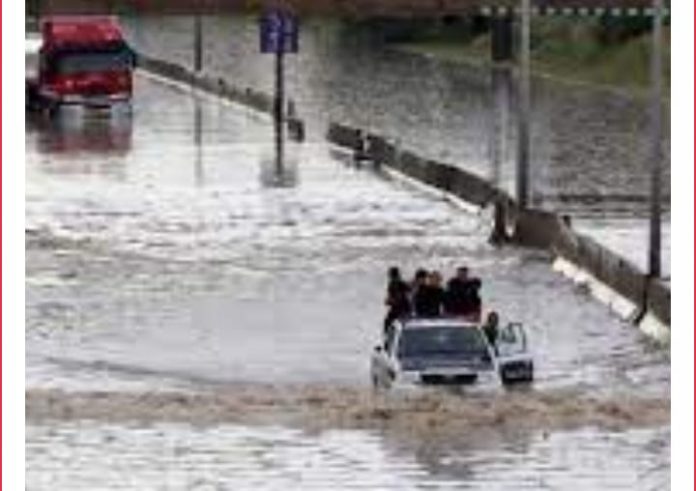Shipments of international aid began to arrive in Libya on Saturday, offering a lifeline to thousands despite dwindling hopes of finding more survivors days after deadly flash floods.
Sunday’s floods submerged the port city of Derna, washing thousands of people and homes out to sea after two upstream dams burst under the pressure of torrential rains triggered by a hurricane-strength storm.
Conflicting death tolls have been reported, with the latest issued on Saturday by the health minister of the eastern-based administration, Othman Abdeljalil, putting the number of lives lost at 3,166.
The World Health Organization said “the bodies of 3,958 people have been recovered and identified”, with 9,000 more still missing, as it announced 29 tonnes of health supplies had arrived in the eastern Libyan city of Benghazi.
“This is a disaster of epic proportions,” said Ahmed Zouiten, the WHO’s representative in Libya. “We are saddened by the unspeakable loss of thousands of souls.”
An AFP correspondent also saw two aid-laden planes, one from the United Arab Emirates and another from Iran, land in Benghazi, more than 300 kilometres (186 miles) west of Derna.
A steady stream of vehicles was seen trickling into Derna on a makeshift road as diggers toiled to shift rubble near an apartment block with a missing facade.
In Al-Bayda, 100 kilometres west of Derna, locals worked to clear roads and homes of the mounds of mud left behind by the deluge.
– ‘Smells like death –
The floods were caused by hurricane-strength Storm Daniel, compounded by the poor infrastructure in Libya, which was plunged into turmoil after a NATO-backed uprising toppled and killed longtime dictator Moamer Kadhafi in 2011.
Aid organisations like Islamic Relief and Doctors Without Borders (MSF) have warned that the upcoming period could see the spread of disease and grave difficulties in delivering aid to those in need.
Islamic Relief warned of a “second humanitarian crisis” after the flood, pointing to the “growing risk of water-borne diseases and shortages of food, shelter and medicine”.
MSF said it was deploying teams to the east.
“With this type of event we can worry about water-related disease,” said Manoelle Carton, MSF’s medical coordinator in Derna, who described efforts to coordinate aid as “chaotic”.
However, the Red Cross and the World Health Organization pointed out that contrary to widespread belief, the bodies of victims of natural disasters rarely pose a health threat.
The spokesman for the eastern-based Libyan National Army, Ahmed al-Mesmari, on Friday night said the flood had affected “over 1.2 million people”.
“Everything was washed away… the waters have completely cut off the roads in these regions,” he said.
Stephanie Williams, a US diplomat and former UN envoy to Libya, urged global mobilisation to coordinate aid efforts in the wake of the flood in a social media post.
She warned of the “predilection of Libya’s predatory ruling class to use the pretext of ‘sovereignty’ and ‘national ownership’ to steer such a process on their own and in a self-interested manner”.
– Civilian access blocked –
The United Nations has launched an appeal for more than $71 million to assist hundreds of thousands in need.
“We don’t know the extent of the problem,” UN aid chief Martin Griffiths said Friday in Geneva, as he called for coordination between Libya’s two rival administrations — the UN-backed, internationally recognised government in Tripoli, and one based in the disaster-hit east.
The head of the eastern-based government, Oussama Hamad, said that “from Saturday, new measures will be applied in the disaster zone” to search for bodies and any survivors.
The area would be closed off to civilians and security services, he said, adding that “only Libyan and foreign search teams and investigators will have access”.
The scale of the devastation has given way to shows of solidarity, as volunteers in Tripoli gathered aid for the flood victims in the east.
“Everyone in Tripoli is mobilised, and they’re bringing us goods. Tomorrow, we hope that aid will be sent to Derna,” said Mohamed Omar Benour, one of the volunteers. “We hope everything goes well, and may God help everyone.”
The Libyan Red Crescent teams were “still searching for possible survivors and clearing bodies from the rubble in the most damaged areas” of Derna, its spokesman Tawfik Shoukri said on Friday.
He added that other teams were trying to deliver much-needed aid to families in the eastern part of the city, which had been spared the worst of the flooding but was cut off by road.
The International Organization for Migration meanwhile said “over 38,640” people had been left homeless in eastern Libya, 30,000 of them in Derna alone.
Climate experts have linked the disaster to the impacts of a heating planet, combined with Libya’s decaying infrastructure.












